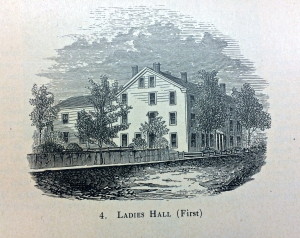Document 5:
Author: Mary Fletcher Kellogg
Recipient: James Harris Fairchild
Date: 17 April 1838
Location: Oberlin College Archives, James H. Fairchild Papers. Series III Courtship Correspondence,
1771-1926, RG 2/003.
Document Type: Transcript (1939) Autograph Letter, Signed by Author.
Introduction:

This letter is Mary’s reply to James’ letter of 16 April 1838. Like her first letter to him, a great deal of it is a justification for her tardiness in replying to him. However, unlike her first letter, the tone here is warm, even teasing. Though James appears to be pushing her to move faster in this correspondence, she seems to have fallen back on the female restraint here; she does not promise to write sooner, but she also does not indicate that she finds his missives unwelcome. This letter shows Mary’s skill in striking a delicate balance between James’ wishes and her own need to maintain what she felt was a respectable distance. Despite this distance, Mary does seem happy to be corresponding with James, and this letter marks the first time she calls him by his first name. In the nineteenth century, men and women, even when friends, often referred to each other as “Mr.” or “Miss” and their last name. The use of first names (also known as Christian names) was a sign of great intimacy. Though James simply decided that he would call Mary by her first name almost as soon as they began their correspondence, Mary was far more reticent.
Transcription:
Thursday Evening, <Apr. 17, 1838 sic>1
Dear James<,>
I hope you are not impatient, waiting to hear from me. It is but about one week, you will recollect, since I have written. But I will conclude from your wise hint, given last evening, in the form of a quotation, that a communication from me, poor and uninteresting as it must be, will not be burdensome nor unwelcome. Indeed I know from my own feelings in the expectation of yours, that even one week seems rather long.
I intended to have written last evening certainly and remained home from meeting for that express purpose, but a severe pain in my head prevented me.
I do not know but you feel rather of disposition to reproach me with tardiness or rather heedlessness in writing, yet I feel innocent of the charge. My mornings<,> you know<,> are occupied with manual labor*,2 my forenoons in study, afternoons in recitations. Evenings are the only leisure hours I have<,> and for the most part these during the week are occupied by meetings. To deprive myself of proper rest, you will know, I better give up anything else.
I am happy that you are punctual in writing, as you indeed are. I am compelled to give you the credit of punctuality in all things. I recollect you were somewhat tardy once or twice last week. I cannot say I felt sorry. You remember the adage<, “>Misery loves Company.<”>3 You possess a considerable share of patience also<,> or you could not thus have borne with me. It is indeed a good school for cultivating this virtue. But surely I cannot say I myself am so benevolent as to persevere in my bad habits simply for the sake of causing your patience to shine forth more conspicuously, which however is not a small object to be gained. But I must cease this strain. I would look over and correct some of the errors but want of time forbids.
Yours sincerely,
MARY
Transcribed by Eve Kummer-Landau.
1 This is added in pencil to the transcription, possibly by an archivist rather than the original transcribers.
2*All students were required to labor four hours daily. By this means, they might earn a considerable part of their expenses. The young men worked in the field or the forest, the shop or the mill and each received from four to seven cents an hour according to his efficiency or his skill. The young women performed the domestic labor in the boarding hall, for which they received three to four cents an hour. To equalize matters somewhat, the price of board was seventy-five cents a week for young women, and a dollar for a young man.
3The quotation “Misery loves company” is attributed to the play Doctor Faustus, written by Christopher Marlowe in the early seventeenth century. The original quotation is in Latin: “Solamen miseris socios habuisse doloris.”